How Can Businesses Cut Cloud Costs Without Losing Performance?
Let's dive straight into the extraordinary synergy between Azure and OpenAI, two industry-leading technologies that are reshaping the digital landscape. With the introduction of the Azure OpenAI Service, this powerful partnership is transforming the way we leverage artificial intelligence (AI) in cloud computing. The Azure OpenAI Service stands at the forefront of innovation, marrying Azure's robust cloud capabilities with OpenAI's advanced AI research to unlock new possibilities and accelerate the development of cutting-edge applications.
In this blog, we will unravel the intricacies of what the Azure OpenAI Service entails, delve into the substantial benefits it brings to the table, examine OpenAI's significant impact on the Azure ecosystem, and highlight compelling use cases demonstrating the transformative power of the Azure OpenAI Service.
In a hurry? Jump straight to your section of interest:
💭 What is Azure OpenAI Service?
🚩 How to Get Started with Azure OpenAI
🚀 How can Azure OpenAI be Utilized?
🌍 Azure OpenAI Impact on Azure Ecosystem
What is Azure OpenAI Service?
Azure OpenAI service refers to the integration of OpenAI's powerful artificial intelligence language models and services into the Microsoft Azure applications and platform.
Microsoft Azure OpenAI is a powerful artificial intelligence service that allows users to create and deploy AI models within the Microsoft Azure platform. With this integration, developers can utilize the power of OpenAI’s language models to build advanced applications, enabling them to automate tasks, quickly process large amounts of data, and interact with customers in natural ways. This groundbreaking technology opens new possibilities for businesses looking to leverage AI solutions for their operations.

The integration of OpenAI into Microsoft Azure will allow developers to quickly and easily build powerful AI models within the Azure platform. With this, applications can be created faster than ever before, allowing businesses to leverage high-powered AI solutions with minimal effort. This also significantly reduces the cost associated with developing and deploying complex AI projects, making it much more affordable for organizations of all sizes to get started on their own AI projects.
How to Get Started with Azure OpenAI
Starting with Azure OpenAI is straightforward. First, create an Azure account and request access to the Azure OpenAI Service. Once approved, you can set up a new Azure OpenAI resource, ensuring network security and organizing with optional tags. Deployment takes only a few minutes, and you can manage your resources through the Azure OpenAI Studio. This user-friendly interface helps you create new deployments and select the OpenAI models you need, allowing for multiple deployments tailored to specific tasks and applications.
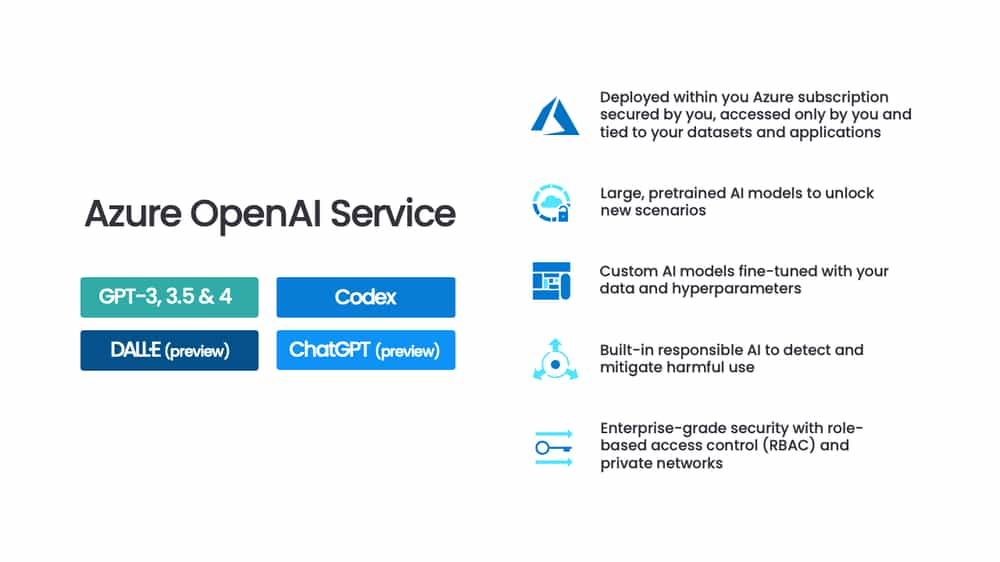
Key Features of Azure OpenAI Service
Azure OpenAI Service offers several key features that make it an ideal solution for businesses:
✔️ Advanced Language Models: Access cutting-edge models like GPT-4, GPT-3.5-Turbo, DALL-E, and Whisper, enabling sophisticated AI applications that understand and generate human-like text, images, and more.
✔️ Responsible AI Safeguards: Microsoft ensures responsible AI use by requiring well-defined use cases, adhering to responsible AI principles, building content filters, and providing implementation guidance.
✔️ Pay-as-you-go Pricing: The flexible pricing model allows you to pay only for the resources you use, making advanced AI capabilities cost-effective for businesses of all sizes.
✔️ Content Creation AI Tools: Utilize tools for text generation, image generation, and more to automate content creation processes, saving time and resources.
✔️ Generative AI Models: Create new content such as text, images, and videos, opening up new possibilities for innovation and creativity.
💡Azure OpenAI Service excels in text generation and completion, offering capabilities like generating coherent and contextually relevant text based on a given prompt, which is ideal for creating content, drafting emails, or generating chatbot responses. It also supports text completion based on partial input, useful for auto-completing sentences, paragraphs, or code snippets. Additionally, the service provides high-accuracy language translation, supporting multilingual communication and real-time translation services.
Model Options
Azure OpenAI Service provides a range of model options to suit different needs:
✔️ GPT-3.5-Turbo: A smaller, faster, and more efficient version of GPT-4, balancing performance and resource usage.
✔️ GPT-4: A large language model for generating human-like text with high accuracy and coherence, ideal for complex tasks.
✔️ DALL-E: Generates images from text prompts, useful for creative projects and marketing materials.
✔️ Codex: A model specialized in understanding and generating code, making it ideal for coding assistance, code completion, and automating programming tasks.
✔️ ChatGPT: A conversational AI model designed for engaging and interactive dialogue, perfect for chatbots and virtual assistants.
How can Azure OpenAI be Utilized?
Microsoft's Azure OpenAI Service has a wide range of potential use cases across various industries such as healthcare, finance, retail, manufacturing, and many others.
Industry Applications
✅ Healthcare: Applications utilizing OpenAI can enable medical professionals to diagnose diseases more accurately using natural language processing and machine learning.
✅ Finance: AI models built with OpenAI can automate the process of analyzing stock market trends or detecting fraud.
✅ Retail: AI-powered applications can provide personalized customer experiences.
✅ Manufacturing: Predictive analytics and real-time insights can optimize operations.
The possibilities are endless!
Below is a sample wireframe schematic of how a contact call center can utilize Azure OpenAI to automatically transcribe speech-to-text to discover conversation trends, insights, call reasons, and much more usable data.
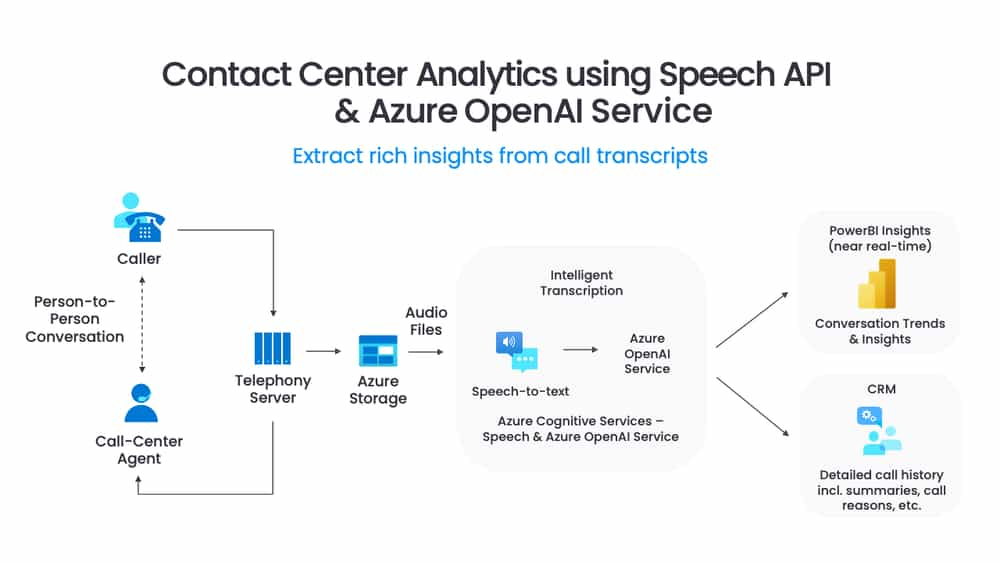
Key AI Capabilities
Microsoft has highlighted various AI capabilities, such as content generation, summarization, code generation, and semantic search:
☑️ Content Generation: Encompasses written, visual, and audio content, helping save time for employees and decision-makers.
☑️ Summarization: Includes summarizing written and video content, financial and analyst reports, charts, and trends.
☑️ Code Generation: Engineers and individuals can save time and avoid tedious work when converting natural language to SQL for telemetry data.
☑️ Semantic search: Enhances the quality of search results for text-based queries. By enabling it on your search service, the query execution pipeline is extended to include a secondary ranking of results based on their semantic relevance. Additionally, semantic search extracts and returns captions and answers that can be displayed on a search page to improve the user's search experience.
Prompt Engineering for Azure OpenAI
Prompt engineering is designing and optimizing prompts to get the best results from Azure OpenAI Service. Here are some tips to help you craft effective prompts:
✅ Clear and Concise Prompts: Ensure your prompts are clear and concise, accurately reflecting the task you want the model to perform. Avoid ambiguity to get precise results.
✅ Specific and Relevant Prompts: Tailor your prompts to be specific and relevant to the task at hand. The more context you provide, the better the model can understand and respond to your request.
✅ Well-Defined Prompts: Use well-defined prompts that are easy for the model to interpret. This helps in achieving more accurate and relevant outputs.
✅ Iterative Prompt Refining: Refine your prompts iteratively based on the results you get from the model. Experiment with different phrasings and structures to find the most effective prompts for your needs.
By following these tips, you can optimize your use of Azure OpenAI Service and achieve your goals with AI more effectively.
Industry Adoption
OpenAI's advanced language models have been utilized in many industries around the world and are becoming increasingly popular due to their ability to process natural languages accurately and quickly. Companies such as Uber, Microsoft, Facebook, IBM, and Amazon have already used OpenAI's language models for various purposes, including customer support services, natural language processing for chatbots or voice assistants, and real-time decision-making applications in the healthcare or finance sectors.
As more organizations explore the potential of using artificial intelligence in their operations, the usage of these powerful language models is expected to grow exponentially over the next few years. Even though this technology is still developing, it will have a continuous and significant impact on the corporate world. This is just the beginning.
Azure OpenAI's Impact on Azure Ecosystem
With OpenAI's integration with Microsoft’s Azure every function and application can have expanded capabilities. OpenAI service is a part of Azure Cognitive Services [read more about Azure AI here]. Tasks such as translation, natural language processing, image recognition, and more can be automated with AI models. The diagram below illustrates the relationship between Azure AI and OpenAI Service and highlights the impact of the latter on the Azure ecosystem. Some examples from the diagram below:
1. Better Microsoft Teams meeting management - through meeting scheduling, transcriptions, speech helper, and more.
2. LinkedIn's better matching and content moderation.
3. Microsoft Word's reading and writing assistance.
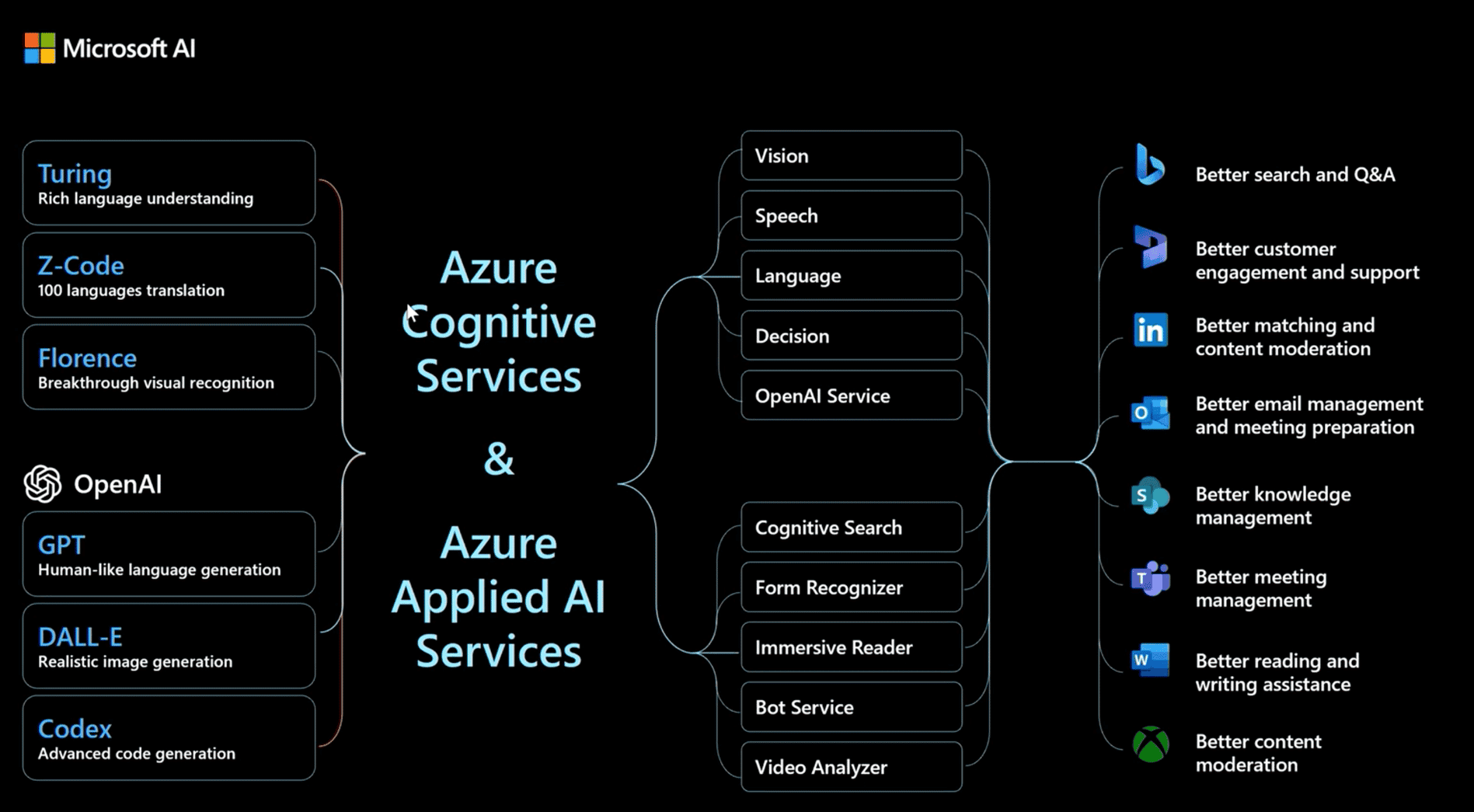
Alongside these enhancements, OpenAI helps other Microsoft innovations like Microsoft Copilot, Azure's Power Platform, and others listed below.
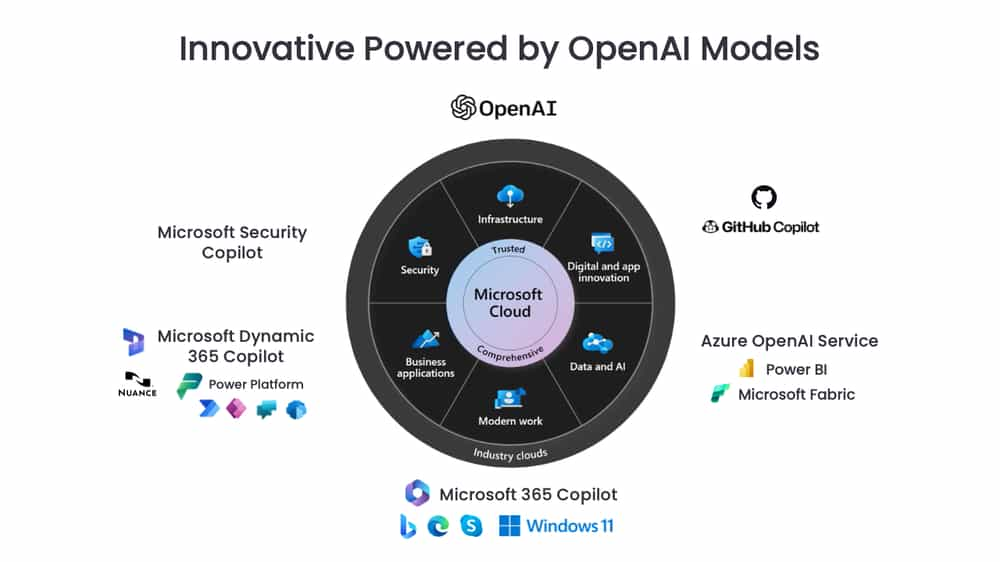
Azure OpenAI Use Cases
This partnership broadens the capabilities of technology, this list includes use cases but it is not limited to these applications:
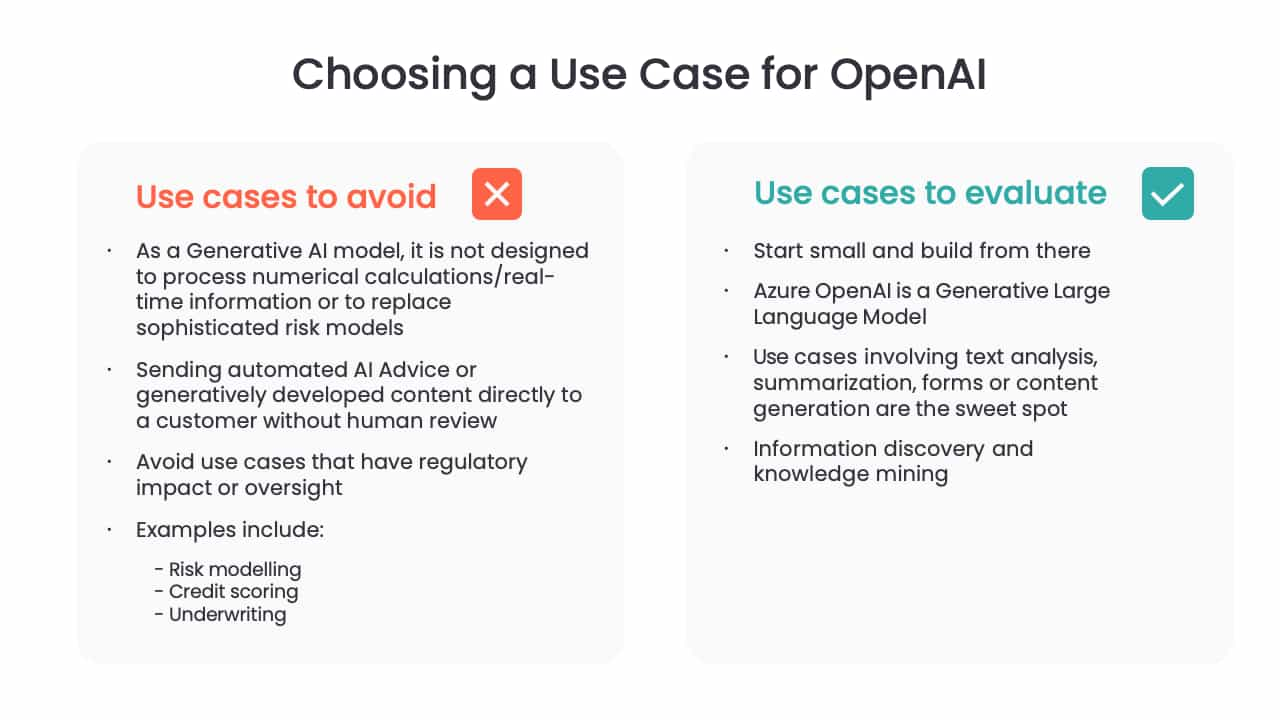
✔️ Reason over structured and unstructured data: The available methods for analyzing user inputs are classification, sentiment analysis, and entity extraction. Some applications of these methods include analyzing the sentiment of product feedback, analyzing support calls and transcripts, and improving text-based searches
✔️ Chat and conversation interaction: The conversational agent allows users to ask questions within a specific range of topics. The agent will provide responses based on reliable sources such as internal company or tech support documentation.
✔️ Chat and conversation creation: The users can develop a chatbot that uses answers from reliable sources like internal company records or technical support documents. The chatbot can only provide responses to specific questions within a defined scope.
✔️ Code generation or transformation scenarios: Examples of what computers can do: Change one type of programming code into another, make a list of instructions for functions, and turn words into SQL language.
✔️ Summarization: The application allows users to submit content for summarization, but only for specific topics stored within the application. It is not a general summarization tool. The available topics include summarizing internal company documents, call center transcripts, technical reports, and product reviews.
✔️ Journalistic content: The application can be utilized to generate new journalistic content or to assist in rephrasing journalistic content from the user within particular topics. However, it cannot be used for creating content on any general topic. It is strictly prohibited to utilize the app for creating content that promotes political campaigns.
✔️ Question-answering: The application allows users to ask questions and get answers, which are based on trusted source documents like the company's internal documentation. The answers provided by the application are always supported by trustworthy documentation and are not generated out of thin air.
✔️ Search: Users can search for trusted source documents such as internal company documentation. The application does not generate results ungrounded in trusted source documentation.
Conclusion
Azure OpenAI is a powerful tool for businesses that want to take advantage of the latest artificial intelligence technology. With its integration with Azure, businesses can expand their capabilities and add new features like code generation, summarization, and semantic search. By leveraging AI models within OpenAI Service, companies can automate processes such as natural language processing and image recognition with ease. Businesses will be able to use these models in various domains and applications to save time while helping employees make better decisions quickly. This partnership between Microsoft and OpenAI has already made major contributions to many organizations around the world, including LinkedIn and Uber.
Azure OpenAI is an invaluable tool for businesses looking to take advantage of the latest artificial intelligence advances. By leveraging OpenAI Service within Azure, organizations can automate processes such as natural language processing and image recognition with ease. Through its integration with Microsoft's products, companies can benefit from AI in many ways and build new applications that make their operations faster and more efficient. The potential is almost limitless!
Stay ahead of the tech curve and elevate your organization's performance by seamlessly integrating AI into your workflow. Don't risk being left behind with outdated technology—become a fast follower and strategically invest in AI services to bridge any gaps in your technology roadmap. Assessing your organization's readiness for AI is no longer an option; it's a necessity for staying competitive. Ready to revolutionize your workflow? Take our quick AI assessment now and unlock unparalleled efficiency and innovation tailored to your organization's unique needs. Don't just keep up; lead the way with AI integration.
Stay ahead of the tech curve and elevate your organization's performance by seamlessly integrating AI into your workflow. Don't risk being left behind with outdated technology—become a fast follower and strategically invest in AI services to bridge any gaps in your technology roadmap. Assessing your organization's readiness for AI is no longer an option; it's a necessity for staying competitive. Ready to revolutionize your workflow? Take our quick AI assessment now and unlock unparalleled efficiency and innovation tailored to your organization's unique needs. Don't just keep up; lead the way with AI integration.

January 31, 2025
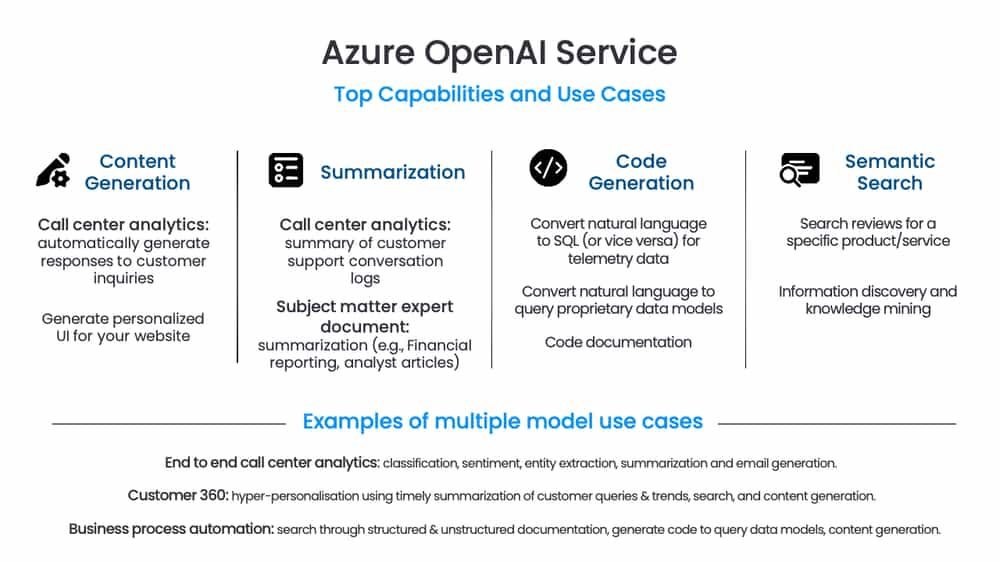





Comments